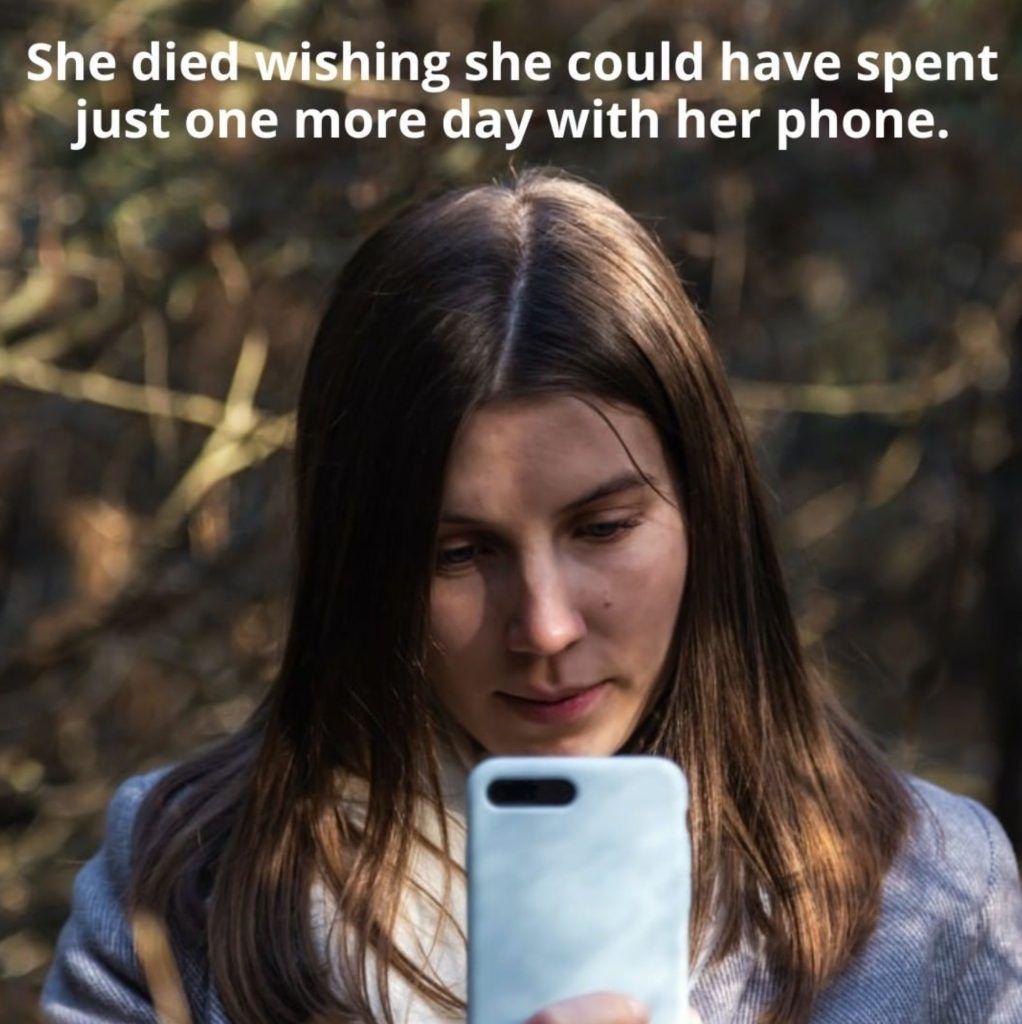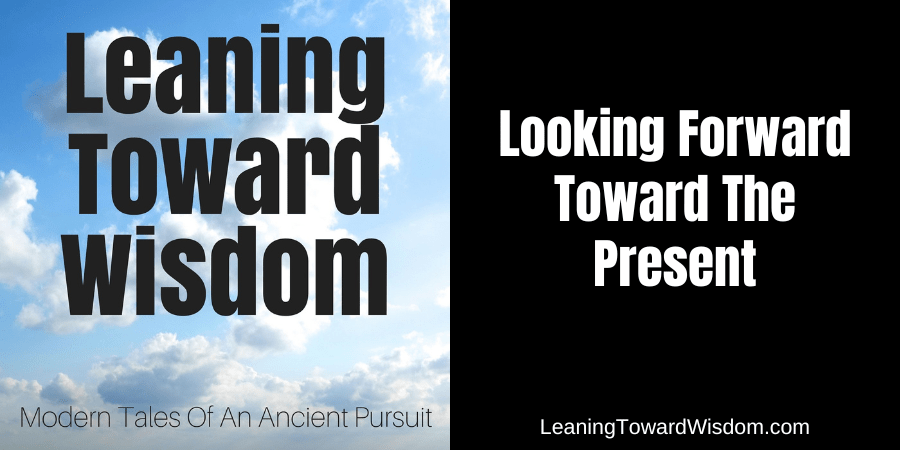Podcast: Play in new window | Download (Duration: 41:13 — 37.7MB)
Subscribe: Apple Podcasts | Spotify | iHeartRadio | Email | RSS | More
Pearl Jam’s 1996 song, Present Tense (from their No Code album), is a fitting theme for today’s show. To live in the present tense. But first, as I am wont to do, let me give you the impetus for today’s show.
I’m watching some house hunting kind of show on HGTV, the kind I normally don’t watch – I much prefer the renovation shows. A couple is going through a few houses and in each house one or both exclaim how they could see themselves doing this or that in the space. Says the husband about a basement, “I could see myself enjoying watching games on a big TV down here.” Says the wife of the bathroom, “I could see myself relaxing in that soaker tub.”
Watch any episode of any such show and I guarantee you’ll hear people say similar things. People put themselves into these homes as though they already own them. It’s exactly what sellers and realtors want people to do. Imagine.
It’s a uniquely human capacity – to project ourselves into a future that hasn’t yet happened.
My longtime fascination with how our minds work – or sometimes fail to work – kicked in. Since my books are mostly gone now and the few physical books I kept are boxed up, I looked through my Kindle library – all 718 titles. One problem I’ve discovered through the years – a problem with neuroscience (the study of the structure or function of the nervous system and brain) – is there are plenty of charlatans in the arena. It’s why I’m so firmly opposed to notions about “the secret,” manifestation, and other “be supernatural” admonitions. For starters, they all elevate humans to god-like status urging us to take command of the universe around us, something no human can do. Disguised as accepting individual responsibility they go way beyond that to fool people into thinking humans have a capacity to do the impossible – to merely think something into existence. Only God, the Creator, has that ability.
Years ago I had to learn that the hard way by devoting hours of reading and study to flush out the garage. Sadly, some of the most successful writers are making bank on the desperate people looking for answers that I believe reside in godly faith.
I dive into the Kindle library to re-read some things and get the hamsters on the wheels in my brain running slightly faster. Mostly, I’m running with this thought expressed by a couple looking at houses. “I can see myself” doing this or that. Something they’ve not yet done, at least not in any of these spaces that sparked their imaginations.
Inserting ourselves into unknown circumstances, situations or places. We do it every time we plan a vacation to a place we’ve never been before. We do when we look at a new place to live. We do it when we fall in love. We do it when we go car shopping. We imagine. It’s more than imaging though – it’s envisioning ourselves as already being in that situation. The more we think about it the more clearly we see ourselves in that situation. The more real it feels and if we want it badly enough…the more we see ourselves there – in a future we want.
That doesn’t mean it will become reality, but there seems to be physical evidence that the way our body responds to our envisioning is very similar to the way our body responds when it does become real. It raises the question, “Does our body know the difference between something we imagine and something we actually experience?” It can feel or seem very real because, in our minds, it is. And our body responds accordingly – as though it has already happened.
The couple admiring the house has put themselves in that house mentally. I’d predict that the house that consumes their imagination the most is the house they’ll buy. It became the most real in their imaginations so they marshaled their resources to make it a reality. That feeling they had while first looking at will be replicated when they buy it and move in. It won’t likely last because these things give way to new aspirations, dreams, and desires.
Rather than thinking about the future, I started thinking about the present.
Going through a lot of old business notes, papers, and presentations – during my purging – I had come across a number of presentations about “being present.” Fanatism with customer service drove me to teach, train and impress on people the power of being present with prospects, customers, and clients. Being present is impossible if you’re not focused on the present moment. That person directly in front of you is invisible if you’re mind is elsewhere.
That’s when I wrote down the phrase that serves as the title of today’s episode, Looking Forward Toward The Present.
I started thinking about all the signs of my own distractions. I thought of all the folks I see distracted.
The power of personal computing in the form of our iPhones is the culprit for many of us. “I’m in the moment,” he says, as he scrolls, types, views, and posts. But I’m not sure that’s true. Isn’t he more in the past – looking to see how many affirmations he may have received in the form of likes, or comments? Isn’t he more in the future – posting something he hopes will gain more attention than what he posted half an hour ago? How present is he?
It was about this time that I created this graphic. I had seen that sentence somewhere, and it made its way into my notebook because it accurately depicts the behavior of too many people.

Being present is growing increasingly harder due to electronic distractions, dissatisfaction, and fixating on the past or the future. All the multi-tasking isn’t helping.
All the cultural observations aside, I was focused on my ability – our ability – to look forward to the present for the purpose of being more present. In the present!
Many years ago I read a book entitled Time Wars: The Primary Conflict in Human History by Jeremy Rifkin. Rifkin observes a distinction between analog watches and digital watches. The analog watch has an hour hand, a minute hand, and a second hand while the digital watch has a constant display flashing the current time only. The analog watch provides us with a visual image of the past – we can see what time it used to be – and the future – we can look ahead and see what time is coming. Digital watches don’t provide that perspective. I read this shortly after I bought the book in 1987, 35 years ago. It remains with me today because I thought it was such a terrific, simple illustration. The present matters, but so does the past. And the future…well, the future is very important. That’s where our dreams, ambitions, and plans are.
In 1987 we were about a decade away from the Internet being pervasive. Ditto for cell phones.
Now, in 2022 the world looks nothing like it did when Rifkin wrote and published that book. Our views of time continue to evolve. The irony is that in this digital age, the age of a constant display of the present time, being present seems harder than ever. We’re faced with all the digital displays constantly flashing PRESENT, PRESENT, PRESENT yet we’re struggling to be present.
Go anywhere there are lots of people. Sit down. Keep your phone put away. Keep your head up and just watch. Observe.
“Sure people are present. They’re just watching their phone or checking it for something.”
Being present means we’re focused and engaged in the here and now, not distracted or mentally absent. Are we present or are we mentally absent diving into a digital world where it’s growing increasingly difficult for some to distinguish between that world and their actual physical world?
“People are doing what they want. If they want to be on their phone doing something, it’s great that they’re able to do that.”
The reasoning that our ability to do what we want is always good for us…well, that’s not true. Never has been. Just look around at our bad behavior and habits. We often crave things that damage or destroy us.
Being in the moment is powerful for everybody involved. You hear it when people comment about the great quality somebody has to “make you feel like you’re the only person in the room.”
Redemption. We all need it, especially those of us who don’t think we need it.
Dawes is one of my favorite bands. This year they released a new record which includes this tune, Everything Is Permanent. I’m not sure what the song is about, but it popped into my mind as I was thinking about today’s show. Everything is permanent in the sense that we’re each fully responsible for how we live. It doesn’t mean we can’t repent and repair things, but it does mean we’re without any excuses to behave poorly. The ripples of our bad choices and bad behavior continue, just like the ripples of our good choices and good behavior. Permanency doesn’t restrict our ability to fix things. Sometimes looking forward to the present is doing our part to redeem ourselves.
I know it’s a hodgepodge of ideas, but time is a complicated thing. Our place in time is even more complex. So let’s try to narrow things down a bit because we could chase a variety of thoughts and many of them would be worthwhile. As your guide today, I really want to achieve one thing for myself and for you – to help us anticipate being more present right now and to build on that every day moving forward. To find a way to be in the moment so we don’t procrastinate to do what matters most.
In a word, let’s focus on NOW.

Let’s get one idea out of the way. Practicality. It’s the elephant in the room against behaving with wisdom every single day. I’m not going to argue against it. It IS impractical. Maybe it’s even unreasonable to assume we could behave like this. To hug as though it were our last. To kiss as though it were our last. But since we’re exercising our imaginations as we look forward to the present – what if we embraced it even though it’s impractical and unreasonable? What if we decided that our present – our NOW – would be guided, not by what’s reasonable and practical, but by something more valuable? What if we suspended reasonableness and practicality? What would that look like? How would that feel?

Some time ago Rhonda and I started thinking more soberly about the next chapter of our life together. I’m not sure exactly when it began, but we started looking forward to our present. It didn’t feel like our present though. It felt like our future. Then one night – maybe it was over a few nights, I can’t be sure – I started realizing that day after day I was not being nearly as intentional as I had hoped. A vitamin container was the reminder and I realized I had thought of this for years and years. Every single day when I take my morning vitamin. Especially when I take Saturday morning’s vitamin and have to reload the whole thing. I think, “Another week gone.” More specifically, I think, “another week gone and what have I done?”
It’s the ever-present reminder that I’m neglecting unreasonableness and impracticality. I think to myself, “You’re not being as weird as you should be.”
Robert (Bob) Sutton is a Stanford Professor, organizational researcher, and best-selling author. He’s one of my favorites. In 2002 he wrote a book, Weird Ideas That Work. It’s about having a creative workplace. Sutton was speaking somewhere and I went to hear him. Afterward, I ran into him in a walkway and told him how much I enjoyed his work, and I handed him a business card I was using at the time. It was simple, but a weird card with my name, one website address, and a picture of Curly from The Three Stooges on it. He chuckled, thanked me, and said, “Stay weird.” I replied, “I’m trying.”
Many days I’m not trying hard enough. And I’m not talking about weird as in strange or goofy. I mean weird as in not surrendering to practicality or reason when it comes to the things that really matter. Rhonda gets the space in my brain about such things.
People say couples should have a date night. Rhonda and I never have had. In my ideal present, our relationship doesn’t get just one date night. It gets more. Then the practical me kicks into gear convincing me that if every night were date night then no night would be special. That’s weird and not in a good way.
So I rewind and begin to think about how I might define “date night.” Most couples define it as going out to eat, then taking in some form of entertainment. That’s practical. And reasonable. What if I don’t want to define it like that? What if date night had nothing to do with spending money? Or leaving the house? At least, not every single time? How might variety be the rule instead of the exception? What would that look like?
I don’t know ’cause I’ve never done it. That’s the point of this episode. To think about such things – to look forward to the present we most want, or the present we know might be most helpful.
I rewound my motivations and thought back to when Rhonda and I were first dating. I concluded there’s one big – ENORMOUS – difference between then and now. Then, I imposed. It didn’t seem like an imposition though. It was leading and surprising. I was driven to dazzle her. More so than I’ve been in recent years. To my shame.
I have no excuse for surrendering to the notion that I’m bothering her. I used to never think about bothering her. In fact, that was kinda the point – to bother her with pleasant surprises. No amount of head trash stopped me. The fact is, there was no head trash about it. I just did it. Until I slowed down or stopped.
Looking forward to the present gave way to the digital phenomenon of Now, Now, Now! And Now, Now, Now just repeated itself over and over like the movie Groundhog Day. Except unlike Phil was eventually learned to invest in each day to get better, I wasn’t making that investment. I was mostly just doing time.
“You can’t live your whole life like you do when you’re dating,” is a common refrain of practicality. But I began to wonder, “Why not?”
It was 47 ago when I first dated Rhonda. What would dating look like 47 years later – with the same couple, now married for almost 45 of those years?
So I started to think about that and imagine what it could look like. Looking forward to the present. By being bold enough to ask and answer the hard questions.
When we first dated we lived hours and hours apart so we only saw each other sparingly. What would dating look like if you didn’t live miles apart?
We weren’t married when we began dating (obviously). What would married dating look like?
What would dating somebody you’d lived with for almost 45 years look and feel like?
I’m liable to disappoint you with my answers. Being the dreamer I often am, I concluded this answer, “Whatever you’d like it to look and feel like.”
Slowly, I started to recognize my feelings of impositions as the surrender they really were. I mean, who am I? This is a very strong woman, my wife. She’s certainly brave enough, pointed enough and plain enough of speech to express displeasure or whatever else she’d like. She’s compliant, but not a person to be easily put upon. I concluded I’d been selling her short probably due to my own fears of having my ideas or creativity rejected. “What if she doesn’t like it? What if she’d rather not?” On and on when the head trash of ideas, all appearing as though I’d be imposing some unwanted things on her.
I backed my ears after months of misery and mental wrangling and decided I was going to be strong enough to withstand rejection. After all, how else are we going to improve ideas? How else might weirdness become the creativity that changes everything for the better? Besides, if a man is unwilling to risk rejection from a woman he’s been married to for nearly half a century, then what kind of a man is he? 😉
My unwillingness to give it a go wasn’t going to do anything to move anything in any positive direction. Rather, it was only going to serve to waste time. The present.
It proves a few points. One, no matter our age or the length of a relationship, fear still persists. Two, bravery is always needed if we’re going to find a way forward. Three, without a risk of failure there can be no success. Four, if looking forward to the present involves a person you care about, then stop wasting time. Give it a go!
Part of using our imagination is to think about – to dream about – what it might be like versus what it currently is.
Maybe it’s dissatisfaction with the present. Maybe it’s wondering how it might be better. Maybe it’s a bit of both.
Looking forward speaks of the anticipated improvement. We look forward to something that excites us. Something we most want to happen. Something for which we’re happily anticipating. I was looking forward to the present in my marriage, a lifelong habit I’ve had driven by my introspection on how I might be able to step up my game as a husband. And as a father. Now, as a grandfather. But it always starts with who I am to Rhonda.
When things go sideways – as they too often do (and have) – is when I don’t start with that. Whenever I start with who she is, I lose my way. It’s one of those ying-yang things. It’s far more selfish when I start with her and think she ought to do this or that. Whenever my expectations begin with her, not me – it’s selfish. But whenever I assume the responsibility for the outcome – all of it – then my focus goes on judging myself, not her. I become less selfish when I focus on what I should do – or what I could do – to make things better!
What I’ve learned is that if I want my present to be better – if I truly want to look forward to the present – then I must behave more urgently. I need to consider the magnitude of the moment. This moment. This very second.
For me, the biggest component is bravery. Courage.
Taking action at this moment fails every single time I refuse to step into the face of risk. I convince myself not to do it – for a million different reasons, none worthwhile. They’re all just excuses.
Courage is hard. Cowardice is easy.
Do it now. That’s hard. Talking yourself out of it. That’s easy.
Success is in that area where fewer are willing to travel. Failure is super easy, which is why we mostly experience it. Failure isn’t the same as giving it a go, only to discover “well, that didn’t work out as I hoped.” That’s learning. Failure is refusing to give it a go for fear it won’t work out. It teaches us nothing. It just reinforces our cowardice. And our habit of failure.
A quote leaps to mind: “Better to have loved and lost than to never have loved at all.”
Better to give it a go and learn than to sit back convinced it’s not worth trying. Learning is always worthwhile.
What would life be like if I devoted myself to wooing my wife daily? What would life be like if I dedicated myself more fully to being a man after God’s own heart? What could life be like if I gave myself to looking forward to the present?
I don’t know, but it’s time I find out.

Please tell a friend about the podcast!


